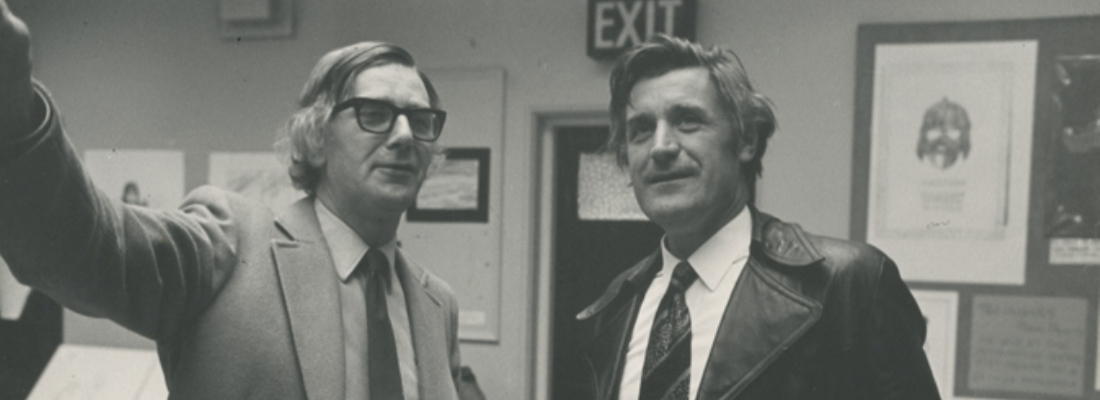In Memory of Michael Dawson (1932-2022)
Having decided to establish a literature festival in Ilkley, Michael Dawson knew that the launch programme would set the event’s tone and ambition. WH Auden, arguably the twentieth century’s foremost English-language poet seemed a suitable, if outlandishly ambitious prospect.
Reportedly finding Dawson ‘likeable’, over lunch in Soho, York-born Auden offered to read a lesson at the inaugural festival’s opening Service of Dedication at St Margaret’s Church.
What seemed like a coup, however, became the first of many incidents requiring frantic diplomacy undertaken with Dawson’s apparently unflappable enthusiasm. At first the churchwarden refused to give up his claim on reading the lesson. Then Auden announced that he would only read from the King James scripture. The vicar forbade the use of anything but the New English Bible in his Church. The poet, meanwhile, refused to change from his carpet slippers, even in the company of the Bishop of Bradford.
In the end, Auden attended the service but did not read. He was, however, at many of the opening festival’s events, as well as reading his own works to a packed Kings Hall. Cantankerous throughout, Auden sprinkled sufficient star dust in April 1973 that his benediction features prominently in Festival publicity to this day.
Many other literary giants answered Dawson’s call to follow Auden to the Pennine spa town. JB Priestly, Ted Hughes, Angus Wilson, Conor Cruise O’Brien, Phyllis Bentley, Phillip Larkin, Nirad Chaudhuri, Rumer Godden, Alasdair Grey and Liz Lochead were but a few who featured in early programmes.
The list is all the more remarkable, as Dawson ran five of the seven festivals that he oversaw during annual leave from his day job.
Born in Bradford in 1932, he spent much of his childhood in Sheffield, before studying Fine Art at the University of Newcastle (then a college of Durham University). He worked variously as a school teacher, graphic designer, and youth worker, as well as serving as a Royal Marine. In 1967 he was the founding director of Greater London Arts, a body, that, with a precept from each of the city’s borough’s, promoted the arts. In 1969, he was appointed to run its equivalent body in Yorkshire.
After a time back in the city of his birth, he moved to Ilkely, where in 1973, with a volunteer committee of supporters, he launched the Literature Festival. He would direct six further festivals, which were then held in alternate years.
In all of these, his wife, Megan Dawson, a fellow Newcastle fine arts graduate, was a mainstay. She often took responsibility for discreet festival events among them a childrens’ book club, a second-hand book fair, and a craft bazaar.
Today, many towns promote events devoted to books and literature. In the 1970s Ilkely was only the second to do so, after Cheltenham. The challenges are now hard to comprehend. Media interest in the event, even from papers published in Yorkshire, was limited. Publishers often seemed uninterested in promoting their authors. And many Ilkley natives treated the event with scepticism.
That the Festival endures is testimony, in part, to his vision. From the outset, he insisted that programming should be to international standards. He was also an enthusiast for esoteric spectaculars. John Fox/Welfare State’s transformation of the Cow and Calf quarry into a fiery spectacle was an early example of a site-specific performance art. Unleashing a Dutch street theatre company on the town to promote ‘happenings’ was perhaps a step too far for bourgeois northerners.
After leaving Yorkshire in 1991, he and Megan moved to Bath, Ludlow, and finally Stamford. He established a successful business dealing in and restoring pop-up books, authored a book about gardens in Ludlow, and remained a cultural activist to the end. Shortly after arriving in Stamford, for example, he organised a pensioners’ ‘sit in’ to try and save the local museum. In June, he was in London celebrate the recognition finally accorded to stained-glass artist Ervin Bossányi, whose cause he had championed since the early 1950s. The illness that preceded his death was short and painless; he was lucid to the end.
In 2013 he was invited back to Ilkley to be interviewed at an event celebrating the Festival’s 40th birthday celebrations. As he took his seat on the stage, a member of the audience shouted that it was good to have him back in the town and called out from the auditorium: “you were so inspirational”. Such a response, decades after he left Yorkshire speaks of the magic ingredient he added to committee’s initial programme.
Auden concluded his Festival recitation with the poem ‘A Lullaby’. Its final line “…sleep Big Baby, sleep your fill” was to prove prophetic. That performance was Auden’s last in the UK; he died that Autumn. Nearly half a century later, the man who brought the great poet back to Yorkshire, has joined him at rest.
Megan died in 2011, his son Adam in 2004. He is survived by his sons Ben and Tim.
Written by and copyright of Tim Dawson, 2022.

 Support the Festival!
Support the Festival!